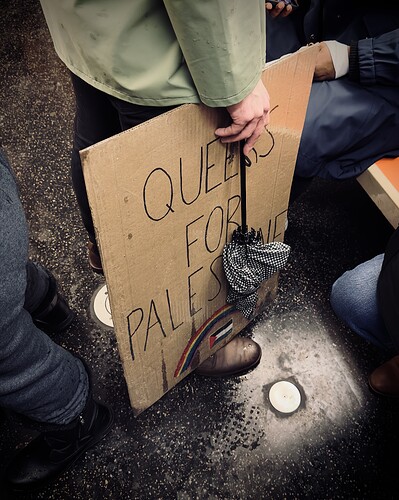When I was moving to Israel, I wanted to learn more about politics and I wanted to get as many points of view as possible. I joined r/Israel, r/IsraelPalestine and r/MiddleEast. In order: very pro-Israel, mostly pro-Israel but open to some more nuanced conversations, very anti-Semitic.
I also was a member of many Facebook groups for people making aliyah (Jews moving to Israel) - everything from people above 50 moving to Israel to being financially smarter to the official group for making aliyah. I’d also joined a group for people “making yerida” (“going down” or leaving Israel), to get the anti-Israel point of view..
Then when I moved to Israel, I joined a bunch of WhatsApp groups of immigrants. When the war broke out, I was recommended to subscribe to various WhatsApp News groups, mostly Israeli sources. This was necessary to keep safe.
On YouTube I subscribe to the channel of an Israeli tour guide who prior to the war occasionally posted about politics, but mostly on things like how to buy a bus ticket or see the big holy sites, but then after the war he wasn’t getting much work as a tour guide so he started to post mostly political content, with a focus on educating about some of the historical facts around the creation of Israel and Palestine. His content is informative but pro-Israeli.
Of course, I get the News feed on my phone from all the big news sources like BBC, CNN, CBS, etc.
There’s very little that feels neutral, and I feel like most of my content is weighted more toward Israel. I have a hard time connecting to the Palestinian point of view even though I try. It’s tough to not feel like they brought all of this on themselves with such a vicious attack on an enemy with a stronger army.
I didn’t seek them out, but because of my newsfeed, I’ve watched more videos than I wished I had from 10/7. They are gruesome. I’ve read more reports of what happened on that day that I wished. I’ve seen videos from a first responder who was documenting what he found at the festival. I’ve seen videos from security cameras near borders. I’ve seen videos that were livestreamed on 10/7 on Telegram by the terrorists themselves. I can’t even talk to people about how awful these videos are because it’s natural to want to turn away; there is something voyeuristic about watching a security camera feed. I don’t recommend to watch these videos, but I don’t know how you can understand the Israeli position without seeing them.
What’s particularly hard for me is that a lot of the people at the festival and in the kibbutzes were people who were compassionate to the situation in Palestine and who were actively working to create alliances with people in Gaza. I feel like, politically, I align a lot with those people. Then to see what happened to them, how their trust was taken advantage of and in such brutal ways, I have a hard time reconciling it in my mind.
As I followed the war, Israel’s assaults seemed justified to me because the only way to get Hamas out was to get the tunnels, and they were strategically placed in hospitals, daycares, and schools. I’m not sure what choice Israel had but to destroy these bunkers, even if that meant civilians were harmed. If Hamas cared about their civilians, they wouldn’t have put them in harm’s way, and they would wear uniforms, then Israel wouldn’t be put in the position of destroying these people’s homes and hospitals.
But as they get to Rafah and threaten to go in there, it’s as inhumane as the attack that started it all. People are starving, without sanitation, crowded together with nowhere to go. Maybe there is a military need to go in there, but when is it just too far? I don’t want to be a part of a country that responds like this. There has to be another way.
When I watch sources from Israel, they focus on 10/7 and it seems like they are in a bubble where they are unaware of how they are being viewed by the rest of the world. They want the captives back.
If I read a pro-Palestinian source, they focus on how awful and inhuman the Israelis are. Vice versa for pro-Israeli sources. Probably the biggest sticking point is that there are 2 conversations - one about land and one about religion. The land dispute seems solvable. The religious one does not.
I don’t know what the answer is, but I feel like as a Jewish person and Israeli, that I want Israeli to find a way that is in alignment with our values. I need them to stop now, but how do they get Hamas to the table without the threat of violence? It’s hard to sleep at night. I want it all to end.

